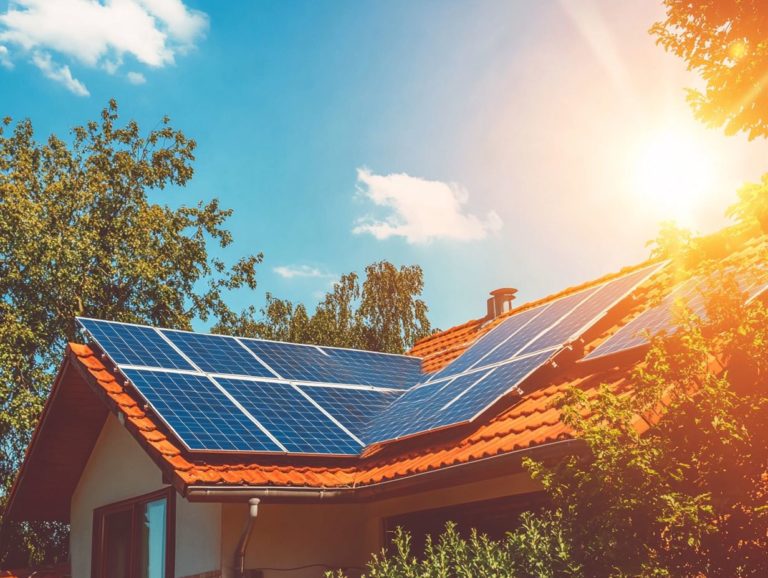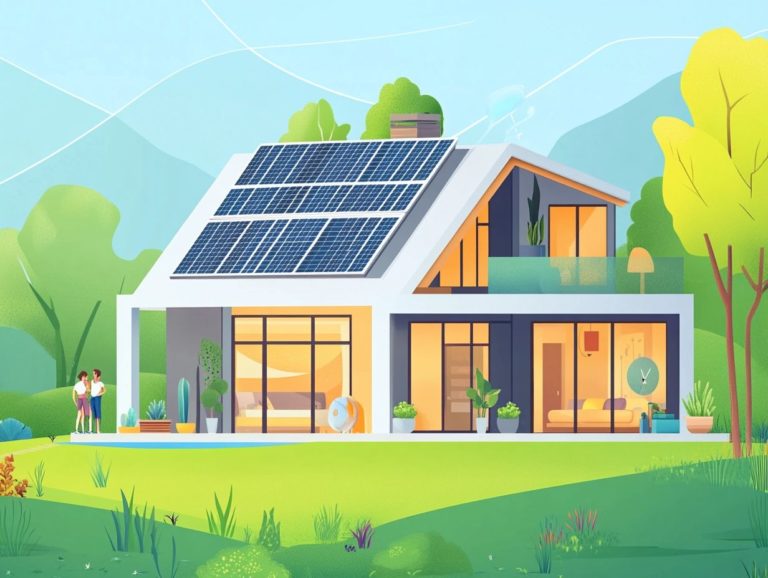“5 Common Myths about Solar Energy Debunked”
Solar energy is often clouded by incorrect ideas that create uncertainty around embracing this sustainable solution. You may have concerns about costs and reliability, along with lingering myths about maintenance and suitability for your climate. These doubts might leave you wondering if solar energy is truly a viable option for your home.
This article dives into five common myths about solar energy, demystifies how it works, and highlights its many benefits. Get ready to uncover the truth and discover how solar energy can transform your life and positively impact the environment.
Contents
- Key Takeaways:
- 1. Solar Panels Are Too Expensive
- 2. Solar Energy Is Not Reliable
- 3. Solar Panels Require Constant Maintenance
- 4. Solar Energy Is Only for Warm and Sunny Climates
- 5. Solar Panels Decrease Property Value
- What Is Solar Energy and How Does It Work?
- What Are the Benefits of Solar Energy?
- What Are the Different Types of Solar Panels?
- How Can Solar Energy Be Used in Everyday Life?
- What Are the Environmental Impacts of Solar Energy?
- How Can Solar Energy Help with Energy Independence?
- What Are the Government Incentives for Using Solar Energy?
- How Can One Determine If Solar Energy Is Right for Their Home?
- What Are the Common Misconceptions About Solar Energy?
- How Can Solar Energy Continue to Improve and Innovate?
- Frequently Asked Questions
Key Takeaways:
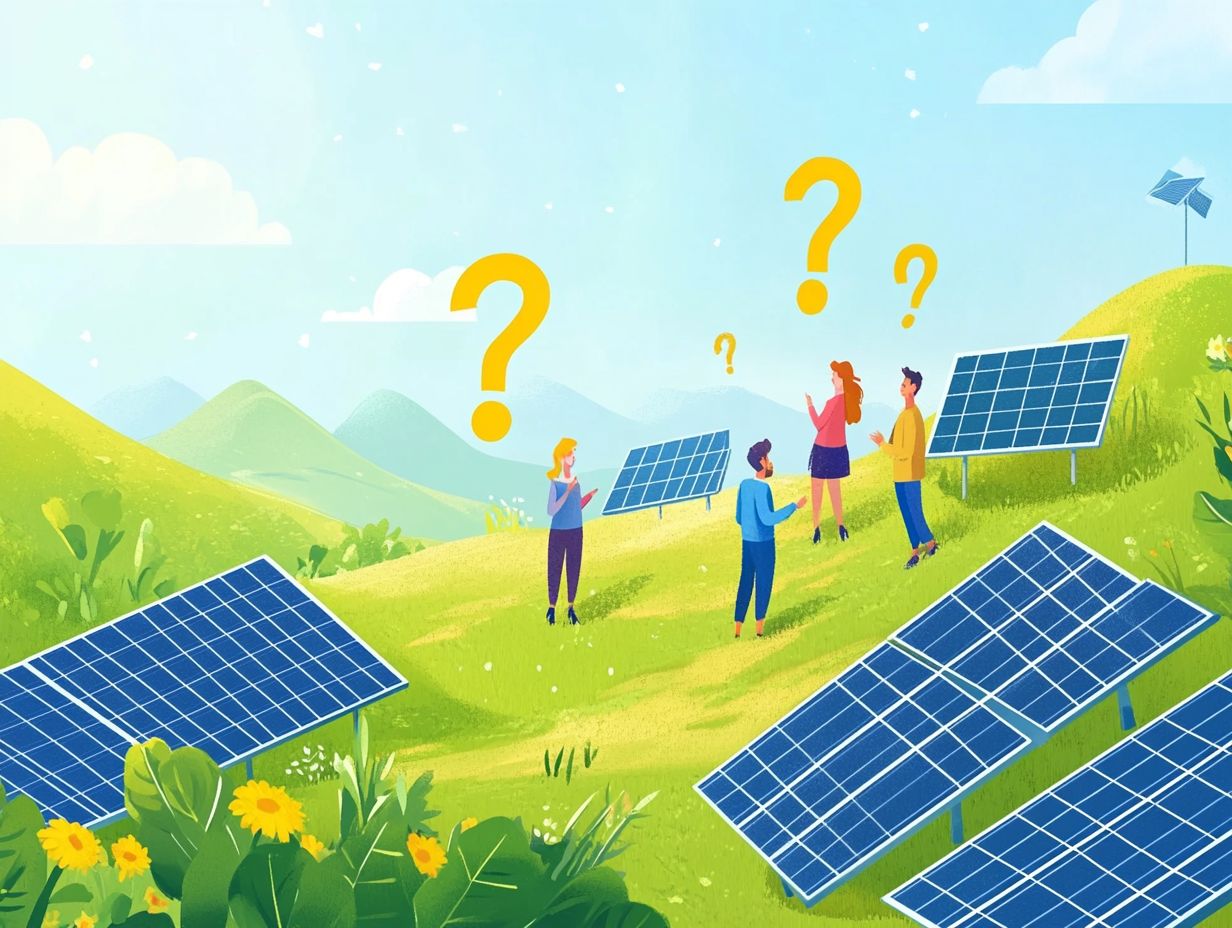
Solar panels are now affordable with government help.
Solar energy is a reliable source, thanks to technology that allows energy storage for cloudy days and nighttime use.
Solar panels require little maintenance, with no moving parts and a lifespan of 25 to 30 years.
1. Solar Panels Are Too Expensive
Many homeowners think solar panels come with a hefty price tag. Long-term savings make solar panels worth the upfront cost. They can trim utility bills and help you achieve energy independence.
In addition to the initial investment, numerous financial incentives can ease your transition to solar power. Tax credits, like the federal solar investment tax credit, can significantly reduce the overall cost. Many states provide rebates that further lighten the financial load.
Over time, you can start saving big on energy costs as solar systems often lead to lower electric bills or even net-zero energy costs. Solar panels are designed to last, typically operating efficiently for 25 years or more with minimal maintenance.
Their durability means they withstand various weather conditions, providing a reliable energy source without frequent repairs.
2. Solar Energy Is Not Reliable
One common myth is that solar energy is unreliable. However, advancements in solar technology and energy storage solutions have made solar energy systems much more dependable. They ensure a consistent energy flow, even during power outages.
By integrating solar into the grid, countries are transforming how power is generated and distributed. This renewable source works well alongside wind and hydro power, creating a diverse energy mix that enhances overall grid stability.
Battery storage technologies, such as the Tesla Powerwall, are crucial in ensuring energy reserves are available during peak times or low solar generation periods. Nations like Germany and the UK successfully combine solar with other renewables, paving the way for a sustainable energy future while improving energy independence.
3. Solar Panels Require Constant Maintenance
You may have heard that solar panels need constant upkeep, but the truth is quite the opposite. Solar energy systems use durable materials that require minimal maintenance, making them a low-maintenance choice for homeowners.
In reality, these systems only need occasional cleaning and a few inspections now and then. Compared to traditional energy systems, which often entail regular and costly maintenance, solar installations truly shine for their reliability.
You can schedule inspections every few years, and let s be honest rain usually cleans them for you. This way, you spend less time worrying and more time enjoying the benefits.
With proper installation, solar energy simplifies your energy generation and provides peace of mind, allowing you to focus on your daily life without the hassle of constant maintenance.
4. Solar Energy Is Only for Warm and Sunny Climates
You might think solar energy is only for sun-soaked locales, but the truth is, solar panels effectively capture sunlight and generate electricity, even when the weather isn’t cooperating. This makes them a reliable renewable resource for various environments.
Recent innovations in solar technology are changing this perception. These advancements allow systems to efficiently harness energy in cloudy or colder regions.
Look at installations in Germany and the Pacific Northwest; they’ve shown impressive performance despite limited sunshine. These cutting-edge solar solutions use advanced photovoltaic cells (which convert sunlight into electricity) and innovative tracking systems to maximize energy capture throughout the seasons.
As a result, even areas with longer winters can reap significant benefits from solar energy. This demonstrates that it s truly an adaptable choice for sustainable power, no matter where you are.
5. Solar Panels Decrease Property Value
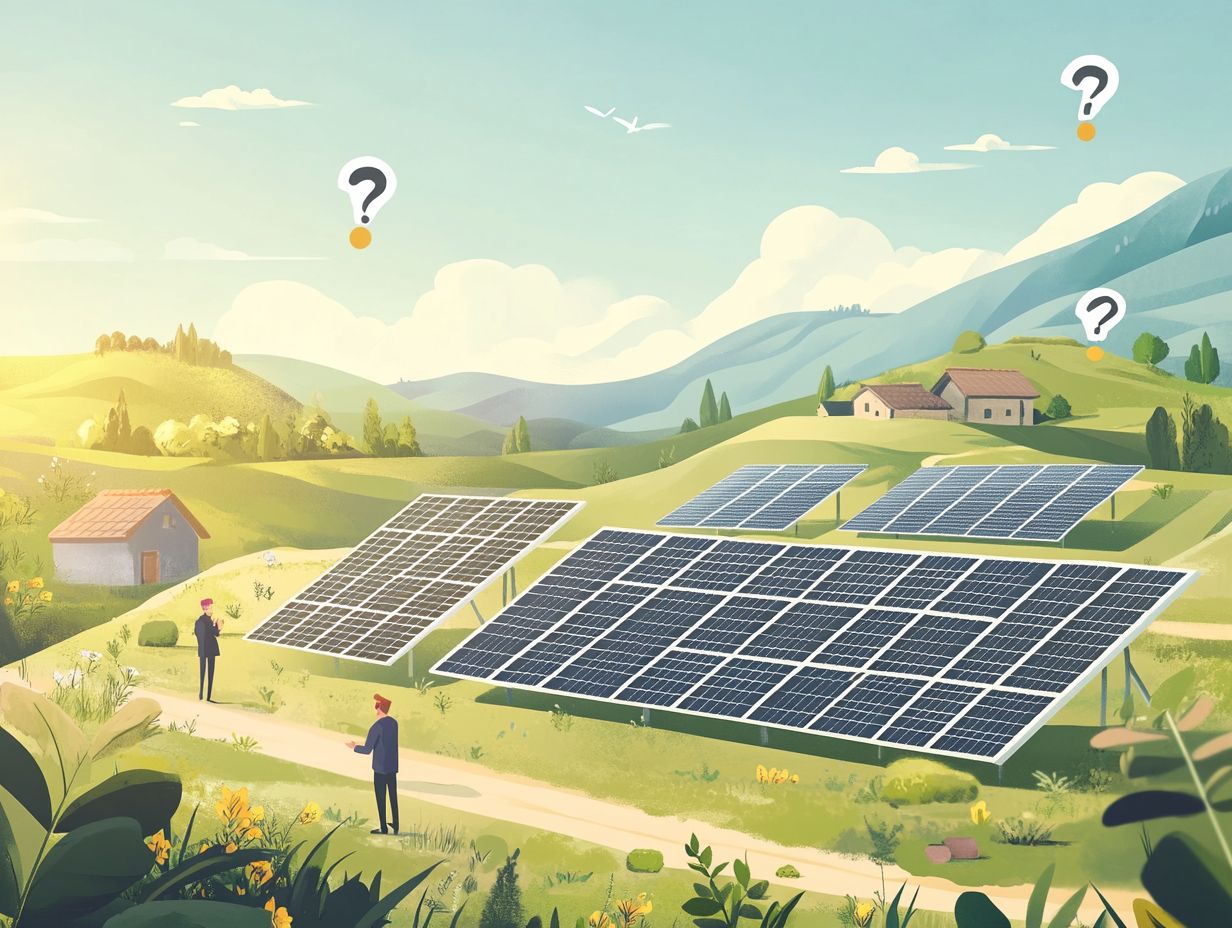
Contrary to the common belief that solar panels might diminish your property value, research shows that homes outfitted with solar energy systems often experience an increase in value. This trend is particularly enticing for eco-conscious buyers who are looking for energy-efficient solutions.
Findings from the National Renewable Energy Laboratory indicate that homes featuring solar installations can sell for an average of 4.1% more than their non-solar counterparts. This offers sellers a noteworthy financial edge. The local real estate market increasingly views solar energy systems as desirable attributes, enhancing the overall appeal of your property.
Buyers are quickly recognizing the long-term savings on utility bills and the potential tax credits associated with solar technology, making these homes not just attractive but also wise financial investments. This synergy between sustainable living and financial incentives ensures that solar-equipped properties shine brightly in a competitive marketplace.
What Is Solar Energy and How Does It Work?
Solar energy is a remarkable form of renewable energy derived from the sun s light and heat. You can harness it through technologies like silicon solar cells, which operate on the photovoltaic effect (this means they convert sunlight into electricity). This makes solar energy one of the most accessible and clean energy sources available today.
In this innovative process, photons strike the solar panels, exciting electrons within the cells and generating an electric current. There s a diverse range of solar technologies available, including thin-film, concentrated solar power, and building-integrated photovoltaics, each designed to cater to various energy needs and settings.
For residential applications, rooftop installations allow you to significantly lower utility costs. Meanwhile, commercial enterprises might deploy large-scale solar farms to meet their substantial energy demands.
By embracing solar energy, you not only contribute to sustainable practices but also enhance your energy independence. This positions solar energy as a vital player in the transition to a greener future.
What Are the Benefits of Solar Energy?
The benefits of solar energy are abundant and varied. They offer environmental advantages like a reduced ecological footprint alongside significant financial perks such as lower utility bills and notable energy savings. This makes solar energy a compelling choice for both homeowners and businesses.
Beyond these immediate rewards, solar energy plays a vital role in tackling climate change by decreasing reliance on fossil fuels and lowering greenhouse gas emissions. By harnessing the sun’s power, you can significantly cut your energy costs now while cultivating a sense of energy independence. This makes you less vulnerable to unpredictable fluctuations in fuel prices.
Investing in solar technology not only enhances your personal savings but also stimulates local job creation, as skilled workers are essential for installation and maintenance. This contributes further to a thriving economy.
This commitment to renewable energy not only supports a sustainable future but also paves the way for communities to flourish in an ever-evolving energy landscape.
Discover how you can benefit from solar energy today!
What Are the Different Types of Solar Panels?
You ll find a variety of solar panels in the market, including monocrystalline, polycrystalline, and thin-film options. Each type boasts distinct characteristics, efficiency levels, and applications tailored to meet diverse energy needs and budgets.
Monocrystalline panels stand out with their high efficiency, often surpassing 20%. This makes them a perfect choice if you re a homeowner with limited roof space but still keen to optimize your energy output.
Polycrystalline panels offer a more budget-friendly alternative, generally achieving efficiency rates between 15% and 18%. They re ideal for larger installations where space isn t a pressing concern.
Thin-film solar panels, while the least efficient typically below 13% come with their own set of advantages. They perform well in shaded environments and are lightweight, allowing for flexible mounting options.
This versatility means you can still effectively harness solar energy, even in regions that don t bask in ideal sunlight.
How Can Solar Energy Be Used in Everyday Life?
You can seamlessly integrate solar energy into your daily life through a range of applications. These include generating electricity for your home, heating water, and even powering your electric vehicle. This not only addresses your diverse energy needs but also helps reduce overall energy consumption.
By utilizing solar panels, you can generate your own electricity, significantly lowering your utility bills while contributing to a cleaner environment. Innovations like solar battery storage take this a step further, allowing you to save excess energy for later use, particularly during peak demand times.
Solar water heating systems offer a sustainable approach to heating water in your home, further driving down your energy costs. Emerging technologies like thin-film solar cells and solar carports enhance the versatility of solar energy installations, making them suitable for various residential setups.
This is your chance to join the green revolution! Embracing these solutions empowers you to make a positive impact on both your home and the planet.
What Are the Environmental Impacts of Solar Energy?
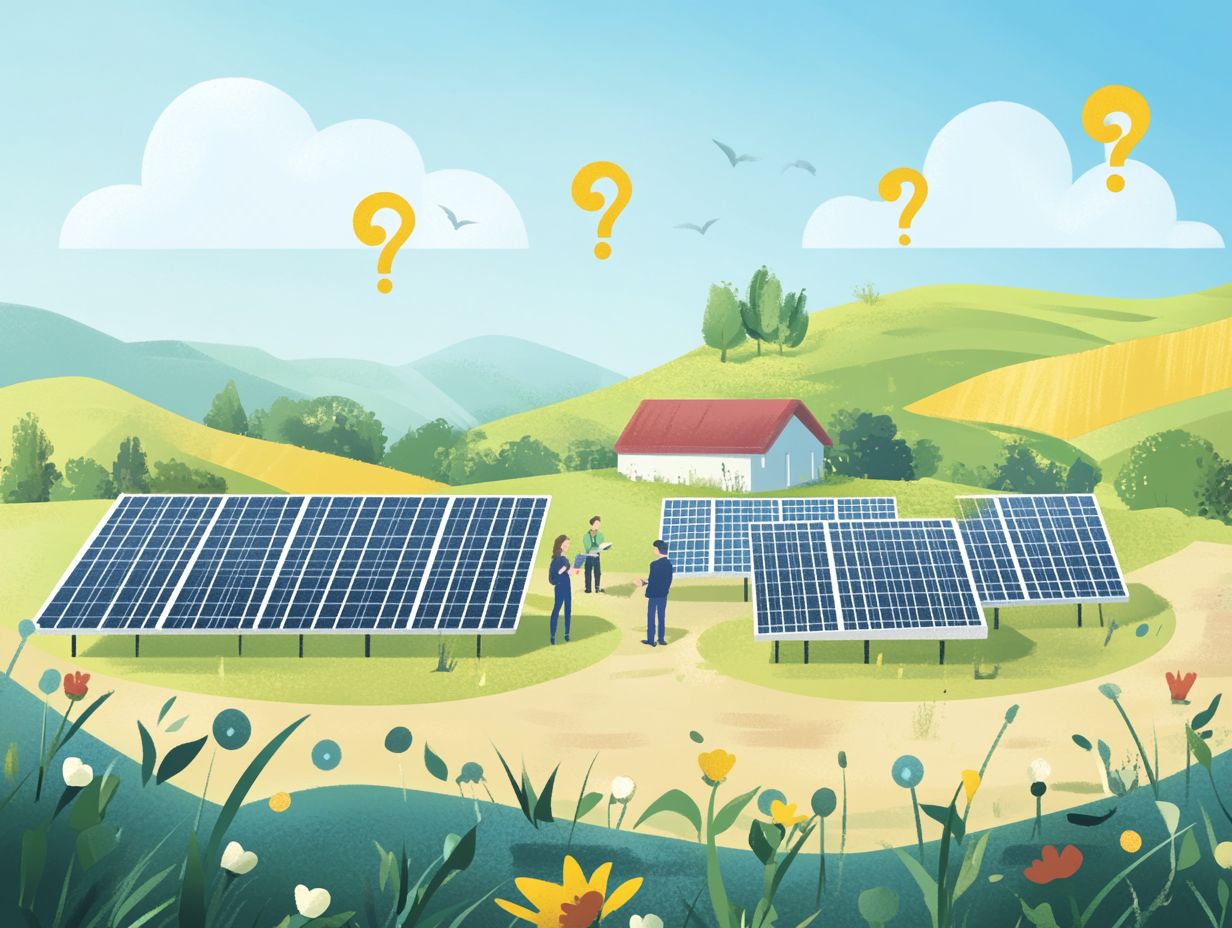
The environmental impacts of solar energy are predominantly positive. By opting for solar, you embrace a clean alternative to fossil fuels, significantly reducing greenhouse gas emissions and lowering your ecological footprint all contributing to the battle against climate change.
Harnessing the sun s power not only satisfies your energy needs but also aids in the preservation of our precious natural ecosystems. The life cycle of solar panels is crafted with sustainability as a priority, using abundant materials like silicon that are less harmful to the environment.
Today s recycling innovations ensure that when solar panels reach the end of their life, they can be recycled or reused, reducing waste.
As society transitions towards renewable resources, recognizing these life cycle benefits is essential for championing environmentally friendly energy solutions.
How Can Solar Energy Help with Energy Independence?
Solar energy is essential for achieving energy independence, giving you and your community the power to generate your own electricity. This not only reduces your reliance on fossil fuels but also allows you to participate in net metering programs, which give you the opportunity to sell excess energy back to the grid.
Harnessing solar power brings the dual benefit of lower energy bills and a reduced environmental footprint by cutting down on greenhouse gas emissions. Many local and state policies actively promote solar installations with enticing incentives like tax credits and rebates.
These supportive frameworks make it considerably easier for homeowners and businesses to invest in renewable energy technologies. By backing net metering programs, jurisdictions enhance the financial advantages of solar energy, ensuring that you receive fair compensation for the power generated by your solar systems.
Embracing solar energy not only paves the way for a sustainable future but also strengthens the economic resilience of your community.
What Are the Government Incentives for Using Solar Energy?
Various government incentives, including tax credits and rebates, significantly enhance the financial viability of solar energy. These incentives make it easier for you to invest in solar energy systems and contribute to a sustainable future.
Federal tax credits allow you to deduct a substantial percentage of your installation costs from your federal taxes. Many states also offer tailored programs that promote solar adoption, such as performance-based incentives or upfront rebates. These options can further reduce your out-of-pocket expenses.
Local governments may provide grant options to help cover installation fees. This support lowers your initial investment costs and boosts your long-term financial returns through reduced energy bills and increased property values.
How Can One Determine If Solar Energy Is Right for Their Home?
To determine whether solar energy is right for your home, you need to evaluate your energy consumption patterns. Assess your roof s integrity for solar panel installation, and consider local solar incentives that can enhance the financial benefits of a solar system.
Analyze your local weather conditions, as sunlight availability significantly influences solar panel efficiency. Ensure your roof is structurally sound and favorably oriented and shaded to maximize energy production.
Familiarize yourself with local laws or regulations regarding solar installations to make informed decisions. Consider your long-term plans, as fluctuations in energy needs over time may affect the suitability of adopting solar technology.
What Are the Common Misconceptions About Solar Energy?
Common misconceptions about solar energy, such as thinking it s ineffective on cloudy days or too costly to install, often prevent you from discovering the benefits of renewable energy. Understanding these facts is essential.
Studies show that solar panels can generate significant energy, even on cloudy days, effectively tapping into diffuse sunlight. Thanks to advancements in technology, installation costs have dropped considerably over the years, leading to quicker returns on investment.
Solar energy helps lower your energy bills and plays a vital role in combating climate change. By debunking these myths, you can make informed decisions about adopting solar technology and contribute to a more sustainable future.
How Can Solar Energy Continue to Improve and Innovate?
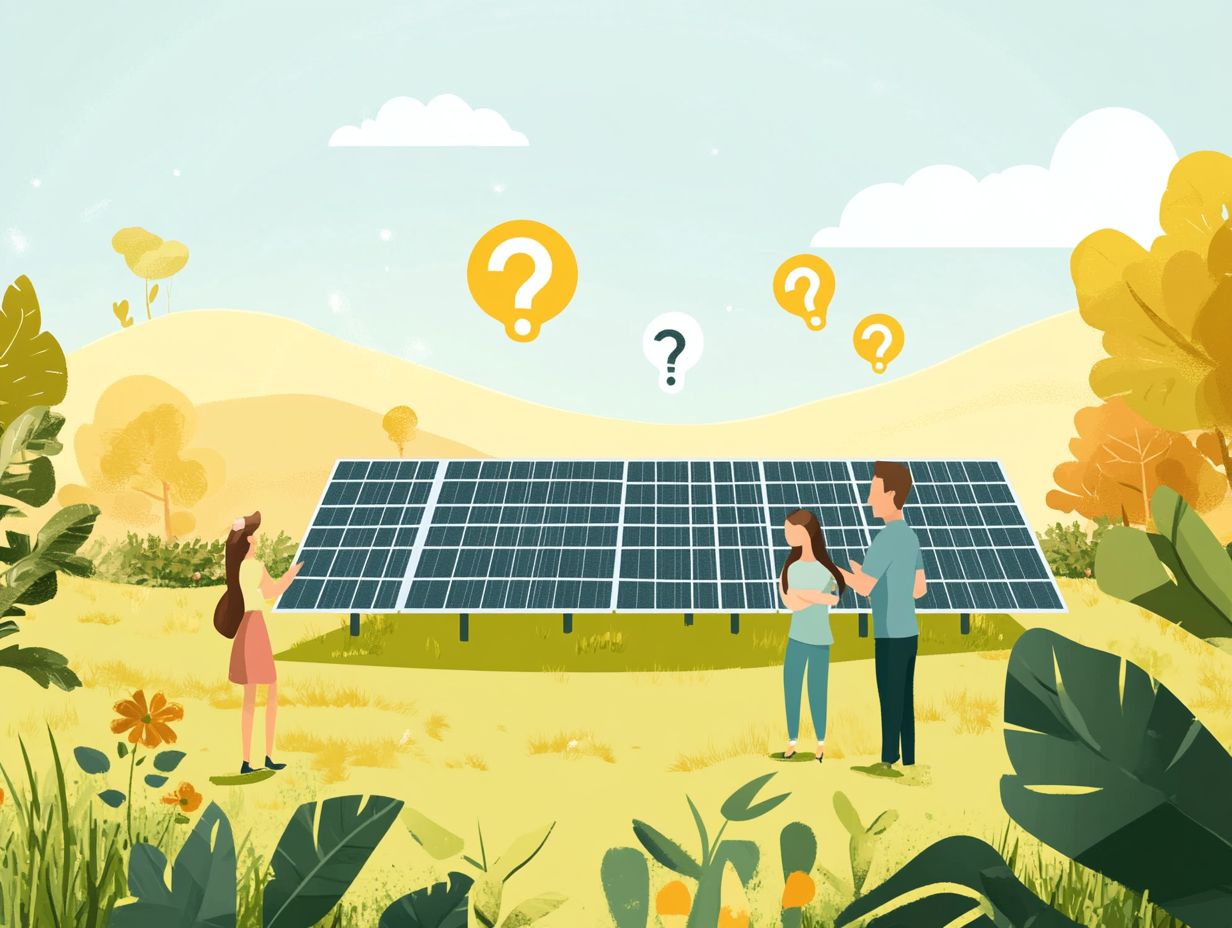
Research and development are continuously pushing the boundaries of solar energy. Innovations, like more efficient solar panels that convert sunlight into electricity and enhanced energy storage solutions, are set to elevate the effectiveness and allure of solar systems.
Recent trends showcase significant leaps in panel efficiency. Cutting-edge designs harness materials like perovskite, which have the potential to revolutionize energy conversion rates.
Battery storage technology is also undergoing transformative advancements, enabling superior energy retention and usage during peak demand. Emerging solutions, such as solar skin technologies and building-integrated photovoltaics, broaden the reach of solar energy, making it more accessible in urban areas.
As these innovations gain momentum, they will shape future energy landscapes, encouraging wider adoption and nurturing a greener economy.
Frequently Asked Questions
What are some common myths about solar energy?
- Solar energy is too expensive.
- Solar panels only work in sunny climates.
- Solar energy is unreliable.
- Solar panels require a lot of maintenance.
- Solar energy is not a viable source of energy for large-scale use.
Explore your solar options today and take the first step towards a sustainable future!
Is it true that solar energy is too expensive?
No, this is a common myth. The cost of solar energy has decreased significantly in recent years and is now more affordable than ever. Additionally, there are many financing options available to make solar energy accessible to all homeowners.
Do solar panels only work in sunny climates?
No, solar panels can still generate electricity on cloudy or overcast days. While they do work more efficiently in sunny conditions, they can still produce energy in a variety of weather conditions.
Is solar energy unreliable?
No, this is a myth. Solar energy is a reliable source of energy, as long as the panels are installed correctly and receive enough sunlight. Additionally, most systems have a backup battery to store excess energy for use during cloudy or nighttime conditions.
Do solar panels require a lot of maintenance?
No, solar panels are low maintenance and require very little upkeep. They should be cleaned periodically to remove any dust or debris, but other than that, they do not require much attention.
Is solar energy not a viable source of energy for large-scale use?
No, this is a common myth. In fact, many countries and cities are implementing large-scale solar projects to meet their energy needs. Solar energy is a sustainable and renewable source of energy that has the potential to power the world.


